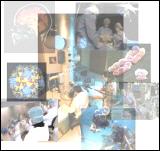Procalcitonine et fibrose rénale
Procalcitonine et fibrose rénale
19/10/2008 - L'AFPRemed Apporte son soutien pour la promotion et la valorisation de travaux de recherche réalisés par des équipes soignantes toulousaines en collaboration avec le Dr Belhadj-Tahar. Il s'agit d'une découverte concernant le rôle de la Procalcitonine dans la protection du parenchyme rénal contre la fibrose. Un article vient d'être publié dans " Infection and Drug Resistance "
(NDLR) Ceci a été rendu possible grace à la complémentarité entre les diffrérents acteurs impliqués dans divers domaines: soins, veille scientifique, recherche biomédicale de pointe (bactériologie, biochimie, scintigraphie, pharmacologie

Procalcitonine comme marqueur biologique
15/10/2013 - Les travaux sur la procalcitonine se sont poursuivis, ainsi ce marqueur biologique a plusieurs applications importantes et notamment en médecine légale pour élucider la cause de décès :
"Procalcitonin interest to assess a septic state inducing the death" a été publié dans "Forensic Medicine and Anatomy Research". Vol.1, No.4, 67-69 (2013)
Ces travaux ont été menés par les équipes
1- "Groupe Recherche & Expertise" de l'Association Française de la Promotion de la Recherche Médicale (AFPreMed)
2- Laboratoire Claude Bernard, Centre Hospitalier René Dubos, Pontoise.
3- Unité Médico-Judiciaire, Centre Hospitalier Emmanuel Rain, Gonesse.
4- Service des Urgences-SMUR Centre Hospitalier Léon Binet, Provins.
Mots clés: Procalcitonine, septicémie, biomarqueur, syndrome malin des neuroleptiques
Key words: Procalcitonin, sepsis, biomarker, neuroleptic malignant
ABSTRACT
In this prospective study, we evaluated the use of PCT when collecting the body which was carried out. The chosen cut-off was set at 10 ng/mL because at this level, the PCT was associated to a multiorgan failure attributable to a septic shock. For 90 cases, two groups were stratified by their final diagnosis: 33 of for non violent deaths and 57 of violent deaths. There was no significant elevation of procalcitonin rate (PCT) in the group of violent deaths. We noted 6 elevations of PCT rate above 10 ng/mL for non violent deaths (15.4%) and in 3 cases there was an evidence for an infectious context (recent anti-infectious treatments, chemotherapy in progress).
Control of CRP performed on blood samples found initial elevations above 10 mg/L in 3 of the 6 cases (including 2 of 3 cases associated with an infectious context). There is no evidence of PCT rate increase for intermediate PMI (post mortem interval), long PMI and undefined PMI. This study found a PPV (positive predictive value) and clinical specificity of 100% for a cutoff set at 10 ng/mL. By taking this threshold, no significant PCT increase was observed in presence of death cases related to a violent origin as well as a fatal multi-organ failure due to malignant hyperthermia syndrome induced by neuroleptic use. The PCT appears to remain stable over time and whatever the conservation conditions of the body.
Full article at: http://dx.doi.org/10.4236/fmar.2013.14014

Procalcitononine en Médecine légale
Research Article
Procalcitonin Interest to Assess a Septic State Inducing the Death, a été publié dans "Medical and Clinical Research". Vol.1 :1-7 (2017)
N Sadeg, F Tarlier, L Veneau and H Belhadj-Tahar
- Association Française de la Promotion de la Recherche Médicale (AFPreMed), 31100 Toulouse.
- Unité Médico-Judiciaire, Centre Hospitalier Emmanuel Rain, 25 rue Pierre de Theilley 95500 Gonesse.
- Service des Urgences-SMUR Centre Hospitalier Léon Binet, Route de Chalautre 77160 Provins.
Abstract
For 90 cases, two groups were stratified by their final diagnosis: 33 of natural deaths and 57of violent deaths. There were no significant elevation of procalcitonin (PCT) in the group of violent deaths. We noted 6 elevations of PCT for deaths of natural origin (15.4%) and in 3 cases there was an evidence for an infectious context (recent anti-infectious treatments, chemotherapy in progress). Control of CRP performed on blood samples found initial elevations above 100 mg / L in 3 of the 6 cases (including 2 of 3 cases associated with an infectious context). There is no evidence of increased frequency of positive PCT for intermediate TPM (time post mortem), long TPM and undefined TPM. The PCT appears to remain stable over time and whatever the conservation conditions of the body. However given the size of some subgroups, it appears necessary to extend this study. The latter study found a PPV (positive predictive value) and clinical specificity of 100% for a cutoff set at 10 ng / L. By taking this threshold, we find no significant increase in cases of violent deaths.
Keywords: Procalcitonin, Sepsis, Biomarker (Pro-calcitonine, septicémie, Biomarqueur)
<Lire article complet//to read full article >
(C) 2008 - Tous droits réservés